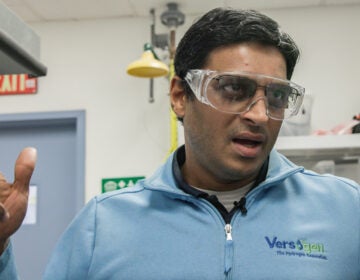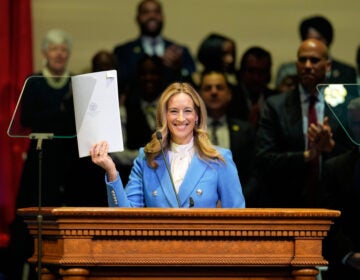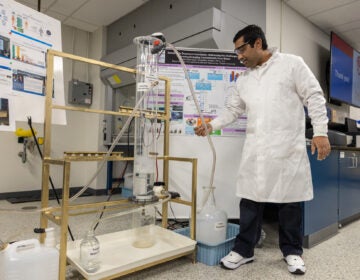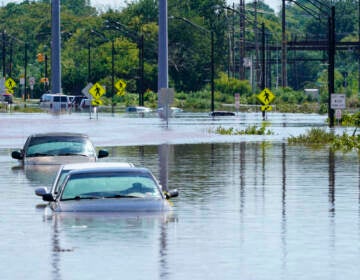Philly-area MACH2 hydrogen ‘hub’ gets greenlight from Biden administration
It’s one of seven hubs across the country that the Department of Energy originally announced in 2023, which will receive a combined $7B from the Bipartisan Infrastructure Law.
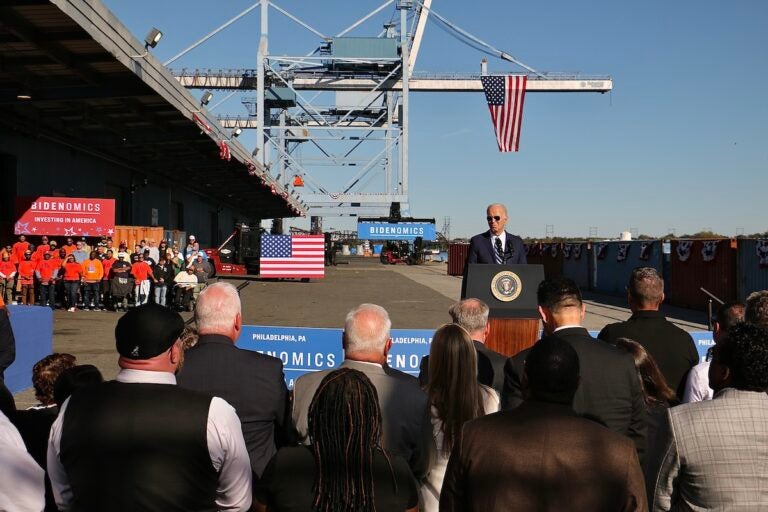
President Joe Biden speaks at the Tioga Marine Terminal in Philadelphia, announcing funds for a ‘’clean energy’’ hydrogen hub in Pennsylvania, New Jersey and Delaware. (Emma Lee/WHYY)
This story is part of the WHYY News Climate Desk, bringing you news and solutions for our changing region.
From the Poconos to the Jersey Shore to the mouth of the Delaware Bay, what do you want to know about climate change? What would you like us to cover? Get in touch.
The Philadelphia area Mid-Atlantic Clean Hydrogen Hub, or MACH2, a public-private consortium of hydrogen producers and consumers, inked a final deal with the U.S. Department of Energy, freeing $18.8 million dollars, with a federal cost share of $750 million, to jump start hydrogen powered manufacturing and transportation in the region that includes projects in Pennsylvania, New Jersey and Delaware. The announcement Friday afternoon comes just two days before President Joe Biden ends his term and president-elect Donald Trump takes office.
It’s one of seven hubs across the country that the Department of Energy originally announced in 2023, which will receive a combined $7 billion from the Bipartisan Infrastructure Law. In addition to MACH2, the department announced Friday it will allocate $20 million in funding for the Heartland hydrogen hub based in North Dakota. The agency had awarded funds to five hubs last year, including one based in southwestern Pennsylvania, Ohio and West Virginia known as the ARCH 2.
The hydrogen hubs were a signature part of the Biden administration’s climate goal to achieve net zero carbon emissions by 2050 — meaning the amount of carbon dioxide going into the atmosphere is balanced by removing carbon emissions over a period of time. This requires replacing coal and oil with cleaner fuels. The MACH2 boosters promise to fast-track commercial scale “clean hydrogen” production – meaning using renewable energy to produce hydrogen rather than fossil fuels. Currently, the vast majority of hydrogen in the United States is produced with a large carbon footprint.
“Those hubs are about people coming together across state lines, across industries, across political parties to build a stronger, more sustainable economy and to rebuild our communities,” Biden said during his announcement in October 2023 at the Tioga Marine Terminal in the Port of Philadelphia.
Energy Secretary Jennifer Granholm described the hubs at the event as the “dawn of a new manufacturing sector in the United States.”
The agreement greenlights the first phase of the project to develop production facilities using ‘green’ hydrogen electrolyzation. The goal is to reduce the cost of ‘green’ hydrogen down to $1 per kilogram of hydrogen by 2031, compared to $4.5 to $12 per kilogram today.
Right now, it’s five times more expensive to make clean hydrogen than it is to make dirty hydrogen using coal or natural gas. Of course, that does not factor in any of the environmental or health costs associated with burning fossil fuels.
The announcement said the hydrogen would be used to replace fossil fuels in industrial settings, including power generation, heavy-duty trucks and fuel cell buses.
“This would contribute to the reduction of carbon emissions by approximately 1 million metric tons per year, equivalent to the annual emissions of more than 220,000 gasoline-powered cars,” the announcement reads. The first phase also includes planning, design and community engagement.
But the project will still face plenty of opposition from those who see it as greenwashing. Critics say hub officials are already failing to be transparent and to meaningfully engage with communities that would be impacted.
“[They] are trying to make all of these connections with these businesses, with the unions, with the politicians. Where is the say of the people who are going to be mostly impacted?” said Zulene Mayfield, of Chester Residents Concerned for Quality Living, at a hydrogen hub protest last year. “We have requested a seat at the table, and still [they’re] cutting the communities out of this … This disrespect is real.”
Some say the hydrogen hubs are the greatest boondoggle since the Concorde. Or worse, a bait and switch — promise green but deliver the same old dirty hydrogen once all the money flows in and the new infrastructure is built.
And while hydrogen burns clean relative to other sources, as it emits mostly water vapor, combustion releases some amount of nitrous oxides.
Examples of proposed MACH2 projects include building a solar field at the PBF Energy refinery in Delaware City, which would provide the electricity to make hydrogen using an electrolyzer instead of the currently used steam methane reformation. SEPTA is planning a pilot project to run hydrogen fuel cell buses and Philadelphia Gas Works, the nation’s largest municipal-owned utility, wants to use hydrogen to power trucks at the Port of Philadelphia.
The region also already has miles of pipelines that connect the different refineries in Delaware and New Jersey, which MACH2 officials say can be re-sleeved to carry hydrogen instead of oil or natural gas. MACH2 officials also promise to create 20,000 jobs. Project labor agreements are part of the plan, ensuring a union workforce.

Get daily updates from WHYY News!
WHYY is your source for fact-based, in-depth journalism and information. As a nonprofit organization, we rely on financial support from readers like you. Please give today.



